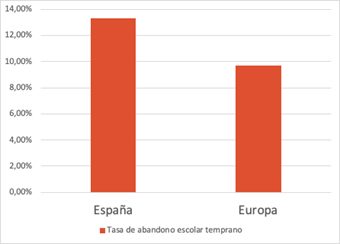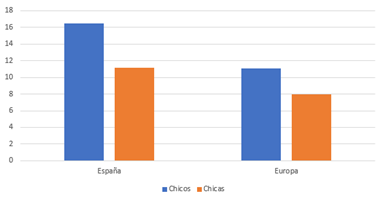How social networks may be influencing socio-educational decisions, shall we investigate?

On the other hand, the growing awareness of the importance of gender equality between women and men is allowing us to have a theoretical corpus that facilitates the study of complex social and educational problems from another gaze, an approach from a gender perspective.
In this case, if a gender perspective is applied to the analysis of data on early school drop out, a gap can be identified in boys, that is, a higher early school leaving rate in boys than in girls.
Critical and feminist pedagogies help to analyze these situations from other points of view, incorporating criteria based on avoiding gender stereotypes and biases in the socio-educational proposals that can be generated to accompany students in these types of decisions.
Looking for possible origins of this gender gap, a factor appears that may be giving us an interesting key: the formation of hegemonic masculine identity, that is, those factors that influence the cultural construction of the masculine identity desired by a patriarchal system.
If this cultural process is delved deeper, different axes can be detected that would be influencing how boys shape their subjectivity, approaching a masculinity with hegemonic traits, such as the search for power and domination, the value of being a leader, aggressive behavior or the cancellation of some emotions and feelings; to achieve an adequate social status, through the acceptance of others.
This process of differentiated gender socialization, through which boys become boys, is mediated by several classic educational agents: the family, the school and the community. But in recent years, a space that significantly influences this educational process has emerged with force: the virtual space made up of the Internet and virtual social network applications.
Exploring this medium, contents and references are identified that, with their discourses and images, influence the formation of male subjectivity. You can find some accounts and profiles that explore and value the diversity of being a man, offering alternative imaginaries… but you can also find many profiles, usually those most followed by adolescent boys, that spread a very specific profile of hegemonic masculinity. From a feminist perspective, the latter would be the most dangerous discourses, since they convey a role for men that, although it may seem attractive and beneficial at first glance, oppresses both them and the girls and women with whom they relate.
But if we want to start at the beginning we should focus on the problem, which, as mentioned at the beginning of the article, is early school drop out.
There is no doubt, looking at the latest data, that there is a significant gender gap. In this case, situations of early school drop out occur when students decide to leave the educational and training system having only obtained a certificate at the secondary or lower school level and not continuing to other higher levels, such as high school or vocational training. intermediate level, or other training that allows them to have a qualification that favors the future achievement of a suitable job to satisfy their vital needs.
Although the school dropout rate continues to decline in Spain, from 26.3% in 2011 to 13.7% in 2023, it continues to be one of the highest in Europe, which currently has an average of 9.5 %.

Tasa de abandono escolar temprano España y Europa (Eurostat, 2023).
Regarding sex, it can be highlighted that, in Spain, of the early school leaving rate for 2023, this phenomenon occurs in 16% in boys and 11.3% in girls. But we do not only find this situation in our country, if we look at other countries or even at the European data, the average of the countries of the European Union for the same year was 11.3% in boys and 7 .7% in girls.

Tasa de abandono escolar temprano en chicos y chicas en España y Europa (Eurostat, 2023).
Likewise, if a profile of youth who leave school early is drawn, different contributions are found from scientific evidence, among which being a man stands out as one of the risk factors (Council of the European Union, 2011; García, 2013; Mora, 2010;
Analyzing these data, the question arises… What is affecting boys so that they make the decision to leave school early that does not affect girls to the same extent? Could this gender gap have any relationship to differentiated gender socialization? That is, are boys learning to be boys in a way that may be affecting their decisions to leave school prematurely?
Investigating to be able to give an adequate answer to this question, we found that, socially and culturally, there are some gender mandates that may be influencing, as a hypothesis, important social and educational decisions for the life trajectories of the students, in this case, male.
If we focus our attention on the issue of hegemonic masculinity, the current model based on the patriarchal system goes through some general aspects, which start from the need for domination, accompanied by aggressiveness, power and control; as well as the association of masculine attributes with a higher level of activity and risk taking.
Normally, gender socialization is based on a binary and exclusive system, where boys have as a reference a male model that is contrary to the hegemonic female model. Therefore, all those attributes that are associated with the expression of emotions and feelings are sanctioned, which are related to tenderness, dialogue as a conflict resolution strategy and being vulnerable to other people, as well as self-care and care to other people in the environment.
In this way, some situations of conflict arise, which in some cases involve violent behavior, towards themselves or towards other people, due to certain roles of being that meet the characteristics described above, as well as problems of self-knowledge and self-esteem and other implications on an emotional level.
As Salazar (2018) describes, masculinity is considered associated with some normative assumptions such as, among others, practical and physical work, the responsibility of being a provider for the family, the responsibility of protecting one’s environment or confronting the norms that They want to subdue or dominate.

Self-made image created with the AI tool https://creator.nightcafe.studio/
It is indeed these last traits that can affect the most when deciding to abandon studies to enter an unskilled labor market, which may be attractive in the short term, but in the long term does not allow a professional itinerary linked to successful trajectories, the latter understood as being able to adequately cover the vital needs of children.
But you can find many profiles on social networks of boys and men with speeches that promote success in another sense, from obtaining income in a simple and effortless way, accumulating wealth, patriarchal masculine values or physical and mental self-discipline. This is what is called the discourse of high-value men, with many accounts and profiles on social networks such as Instagram or Tik Tok in which they accumulate millions of followers.

Imagen de elaboración propia creada con la herramienta de IA https://creator.nightcafe.studio/
Many of them dedicate their professional lives, among other areas, to training activities and events where they transmit their knowledge about how to achieve lives of luxury and success, understood from this discourse that links with hegemonic masculinity, and that seduces so many boys, especially adolescents, who see in his teachings an alternative to effort and patience to follow a safer, enriching and positive itinerary.
Alluding to a false modern thought, very traditional ways of being a man are recovered in this way and within the patriarchal system, which do not give value to the human and social component, but instead proclaim elitist success and sexism, which, as we see, is It may also affect boys and men’s ability to acquire other aspects that they may enjoy more, such as the experience of emotional richness, the release of family responsibilities, learning and more theoretical and academic knowledge, or the pleasure of living non-material experiences with healthy and equal relationships.
Perhaps future research analysing these profiles and their discourses can provide us with some clues about emerging masculine roles, with which socio-educational action professionals can better accompany boys in adolescence, trying to provide other ways of inhabiting their masculinity in order to build healthier, more equal and enriching life projects.
References
Consejo de la Unión Europea. (2011, 28 de junio). Recomendación del Consejo. Relativa a las políticas para reducir el abandono escolar prematuro. Diario oficial de la Unión Europea C 191/01 https://eur-lex.europa.eu/legal-content/ES/TXT/PDF/?uri=CELEX:32011H0701(01)&from=EN
Eurostat (2023). Explotación de las variables educativas de la Encuesta de Población Activa / Indicadores del Marco Estratégico para la Cooperación Europea en Educación y Formación (2021-2030).
https://www.educacionfpydeportes.gob.es/servicios-al-ciudadano/estadisticas/laborales/epa.html
García, M. (2013). Absentismo y abandono escolar. Síntesis.
Mora, A. J. (2010). Determinantes del abandono escolar en Cataluña: más allá del nivel socio-económico de las familias. Revista de Educación, (1), 171-190. https://repositorio.minedu.gob.pe/handle/20.500.12799/1193
Salazar, O. (2018). El hombre que no deberíamos ser. La revolución masculina que tantas mujeres llevan siglos esperando. Planeta.
Serrano, L. (dir.). (2014). El abandono educativo temprano: análisis del caso español. IVIE.

Author:
Sergio Jorge Fernández Ortega
INDUCT Group






